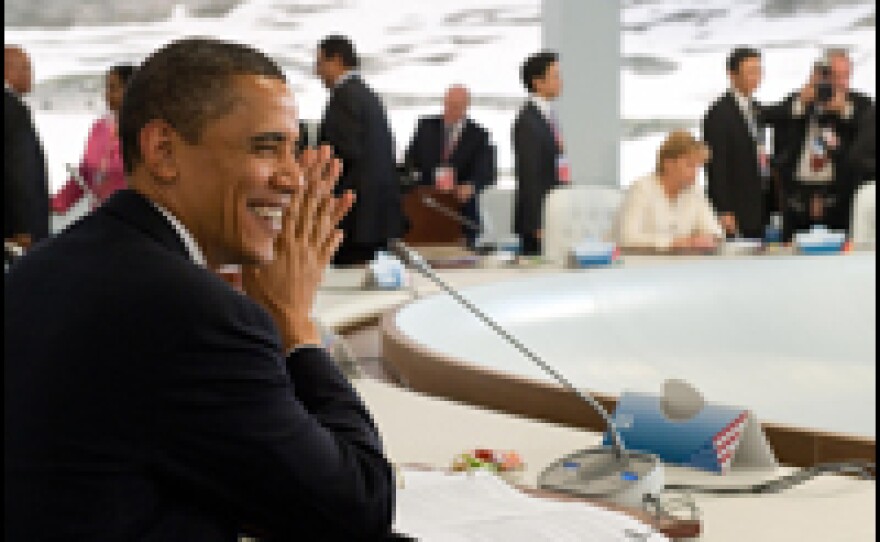Leaders of the world's major industrial countries added some extra chairs around their bargaining table in L'Aquila, Italy on Thursday, inviting heads of nearly a dozen developing countries to join their talks on climate change and other issues.
President Obama chaired the session. With rising temperatures already melting ice sheets and swelling oceans, he said global warming is a problem that cannot be ignored.
"Every nation on this planet is at risk," Obama said after the meeting. "And just as no one nation is responsible for climate change, no one nation can address it alone."
On Wednesday, the major industrial nations that make up the G-8 agreed to cut their aggregate greenhouse gas emissions by 80 percent by 2050. Thursday, the talks turned to developing nations such as India, China, and Brazil.
Like the G-8 members, those countries say global temperatures should not be allowed to rise more than 2 degrees Celsius (3.6 degrees Fahrenheit) from their pre-industrial levels.
But the developing countries refused to set a numerical target for limiting their own greenhouse gases. Experts say without cooperation from developing countries, no effort to fight climate change can succeed.
"Even if we totally eliminate carbon emissions in the (industrial countries) by 2050, there needs to be a substantial reduction from business as usual by the remaining, developing countries of the world," said Alden Meyer of the Union of Concerned Scientists. "To achieve that, they need the financing and the technical assistance to grow their economies in a sustainable way," he said.
A draft proposal that would have provided developing countries $400 million to cut emissions and adapt to the effects of climate change was dropped from the final declaration at Thursday's meeting. Without that kind of funding from rich countries, the developing world is reluctant to sign on to carbon limits.
"They don't have confidence based on this meeting and the last year and a half of opportunities that have been missed by the G-8 countries," Meyer said. "They don't want to be on the hook with no support to help achieve it."
Obama administration officials say there is still time to negotiate cuts in developing countries' greenhouse gases before a United Nations climate summit in Copenhagen in December. They acknowledge that may require both technical and financial support. Finance Ministers have been asked to develop proposals on climate financing for consideration at the G-20 summit in September.
"Our challenge is to be the first country to green not only our own economy here but also to lead the way on green exports to countries like India and China that want to see the kind of low carbon growth that is only going to come with innovation," said Deputy National Security Adviser Denis McDonough.
Obama said this week's talks in Italy have produced a "good start" in the fight against global warming, but he acknowledged that battle won't be easy. Each leader has his own domestic politics to contend with. Climate change legislation in the U.S. only narrowly passed the House last week, and still faces an uphill battle in the Senate.
"But ultimately we have a choice," Obama said. "We can either shape our future or we can let events shape it for us. We can fall back on the stale debates and old divisions, or we can move forward and decide to meet this challenge together. I think it's clear from our progress today which path is preferable."
Copyright 2022 NPR. To see more, visit https://www.npr.org. 9(MDAzMjM2NDYzMDEyMzc1Njk5NjAxNzY3OQ001))







